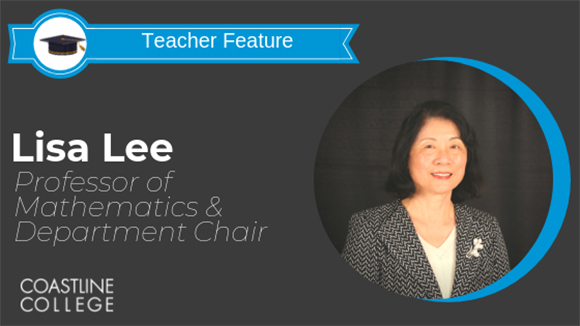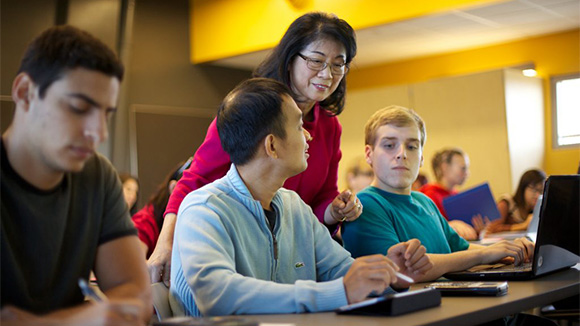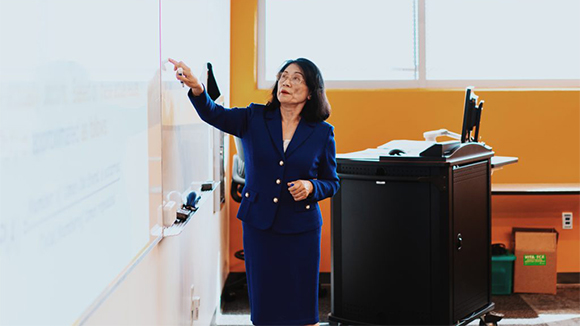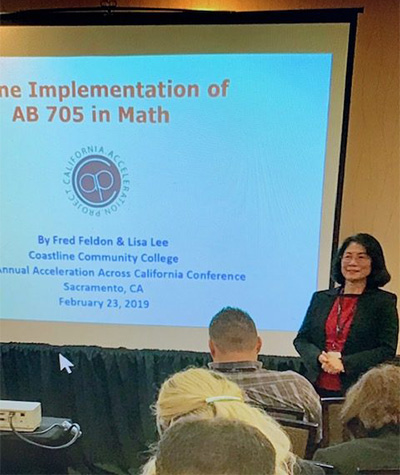This week’s Teacher Feature, Lisa Lee, Mathematics Department Co-Chair, is anything but average. Your love for math will multiply after you hear her passion for her students and online classes.

Tell us about yourself.
Hi! My name is Lisa Lee and I am a Professor of Mathematics and currently serving as the Chair of the Math Department. I have been teaching at Coastline College since 2001 and served as the Math Department Chair from 2011-2017. It was my great honor to receive the following awards: “Teacher of the Year” for Coastline College in 2007; Orange County California Certificate of Merit for 2008 Teachers of the Year; and 2008 National Institute for Staff and Organizational Development (NISOD) Teaching Excellence Award.
I earned a Doctoral Degree in Higher Education Leadership, a Master’s Degree in Mathematics, and two bachelor’s degrees, one in Mathematics and the other in Computer Science. In addition, I studied Applied Statistics in my Ph.D. Program for four years. Before coming to the U.S., I was a licensed high school math/physics teacher and Civil Engineer trainee working at city hall in Brazil.
Moreover, I developed the statistics course content for Coastline Instructional Development Systems’ online product. In addition, I have made several presentations at national and international mathematics and technology conferences: AMATYC, CMC3/South, CMC3/North, and ICTCM. I presented “Teaching Math Using Modern Technology” at the International Mathematics Education Conference in Guangxi, China, in June 2012, in Seoul, Korea, in July 2012, and in July 2016 in Hamburg, Germany.
I have also contributed to the reviewing and upgrading of the mathematics curricula for the Coast Community College District, as part of a steering committee, in order to meet new requirements by four-year colleges and universities.

What do you love about teaching at Coastline?
I am certain that teaching is my passion. Born in an educator’s family, I always had a dream of becoming a teacher. My personal journal, ponderous as it seems, has revealed a valuable lesson to me: If I cannot understand the feelings of others, I cannot understand myself. In turn, this philosophy has given me a great capability to teach those who want to learn, regardless of where they started. My students are aiming towards personal success in their lives and I am thrilled to be a part of this journey.
Having lived in three totally different cultures – Taiwan, Brazil, and the United States, I have learned to respect other cultures. Luckily, Coastline gives me an opportunity to connect with a diverse group of students from all walks of life. Through my diversified experiences, I believe I tend to understand my students better. They come to school with so much hope and I will never take it away from them. My understanding of many languages — Spanish, Portuguese, Mandarin Chinese, and Taiwanese, is also a bridge to their learning processes. Different cultures need different teaching styles and techniques and I apply that to my teaching method. How true it is that saying: “Teaching is a rewarding experience!”
Explore Mathematics Degrees @ Coastline
What is unique about your teaching method?
My teaching style relies on benefiting students the most. For example, during the first day of classes, I make an effort to get acquainted with all my students. Each student has my personal attention on their background and academic preparation; I believe flexible teaching methods need to be applied in every class.
As a professor, I must use alternative learning experiences, then constantly assess and improve curricula, in order to engage and inspire students. Advancing this shift by effective leadership in higher education will allow me to aid many more people in attaining the vital education they need to compete in our global and technological society. I use many technology-assisted teaching methods to help students who cannot learn mathematics in a traditional fashion.

What do you say to students who find math challenging?
Most community college students have a fear of math. When encountering such students, I would say to them, “Nothing in life is to be feared; it is only to be understood.” Moreover, I use real-world examples to solve the problems to help them understand their respective subjects.
Learning math can be a frustrating experience. To those who want to quit the class, I always say to them, “You can do it. If you do your best, I will stand by you to see you make it.”

What makes a successful online class?
If I am honest, learning math online can be challenging, but at the same time, very rewarding. Recently, I researched what the important factors are that contribute to the success of online mathematics courses. The two factors to a successful online class are:
I strive to incorporate both of these characteristics in all my teaching.
Learn More About the Mathematics Department @ Coastline
Tell us something students may not know about you.
I am published! My article “Online Success in Math at the Community College Level” was featured in the Journal of Mathematics Education in December 2018.
The purpose of this study was to investigate the factors that contribute to student success in online mathematics courses at community colleges. The nonexperimental quantitative design began with descriptive statistics to explore the quantitative evidence. Then, the design is applied to multiple regression analysis to identify the significant predictors. As a result, a total of 135 students enrolled in the three online math courses at a Southern California community college were invited to complete the Self-Assessment Questionnaire. This questionnaire was designed based on the seven principles of successful college teaching. Moreover, the findings show that student success was associated with the following areas: Principle One – the interaction between students and faculty and Principle Three – the use of active learning. Mastering online homework has a positive impact on students. Strategies should be developed to encourage interaction between faculty and students and promote active learning environments.
What are your thoughts on AB705?
I have been working on developing a new support course to help our students advance college-level math without completing prerequisites in order to comply with the new Law, AB 705. According to research, placing students directly into transfer-level courses with corequisite course support may increase student success in transfer and completion. Our math department is ready for full implementation in Fall 2019.

What are your hobbies?
I love music and the arts! Every night, I enjoy listening to music, especially piano, while I am working with my online students in the discussion forums. When I get the opportunity to take a vacation, I like to paint in the countryside, either by a lake or ocean to capture the beauty of nature. On a Saturday morning, you could find me walking along the beach appreciating the ocean breeze.
About the Teacher Feature series.
Coastline College proudly highlights its renowned faculty through the Teacher Feature blog series. This week’s feature showcases Lisa Lee, Mathematics Professor and Co-chair of the Mathematics Department.
Like learning about Coastline’s greatest? Check out the previously highlighted #TeacherFeatures. Your future instructor may be amongst the featured!
Blog Updated: October 17, 2023 (title changes, length of service, minor style/grammar details).